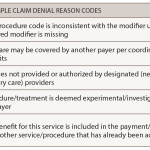Denials management is a growing issue in physician practices nationwide, and your practice could be losing tens of thousands of dollars yearly if you do not have a denials-management strategy in place.
Reports have shown that more and more physicians are turning to denials management to maximize their bottom dollar. The reason is that there is a 5–8% denial rate in most practices nationwide, and reports show 50% of denied claims are never refiled.1 In the denials-management process, 90% of denials are preventable, and 67% are recoverable. For example, a practice with a $1,000,000 revenue stream could potentially have $50,000 to $80,000 in lost revenue if they do not pursue denials.2 Given the magnitude of the numbers, a targeted denials-management strategy is crucial and, with a well-thought-out approach, should result in a significant revenue increase to the typical practice.
It is important to create a combination approach to effectively manage denials. Forming a denials-management team as well as a front-end claims-management team will help minimize denied claims. The workflow for each group should be specific and detailed.
The front-end claims-management team will be vital to the process. Members of the team should include coders, billers, and the medical records department. Their key responsibility is to make sure no claim is filed without verifying the patient’s name, date of birth, and insurance information and validating the diagnosis and procedure codes. Many claims are denied on the first round of submission due to incorrect spelling of name, no modifiers on procedure codes, or improper insurance information. Managing the charge entry and claims on the front end has great bearing on the magnitude of denials received in the office.
Creating a denials-management team is the other step in the process for reducing denied claims and increasing the financial health of your practice. The team should be proficient in analyzing data, creating reports, and understanding the claims-edit management system as well as the electronic data remittances and paper explanation of benefit denial reason codes. The team members should include representatives from patient accounts, the practice administrator or manager, and a coder. The denials-management team should have the main charge of researching the denials, creating the denials report, and developing denials-management solutions.
To have measurable success in managing your practice denials, you must have an efficient reporting system. Reports should be produced in a timely manner to respond to denials or rejections. Daily and weekly reports can be used to follow up on individual or group claims as well as monitor specific problem areas. Monthly reports will identify denial trends with payors, high-dollar claims, denial codes, and departments in your office.


